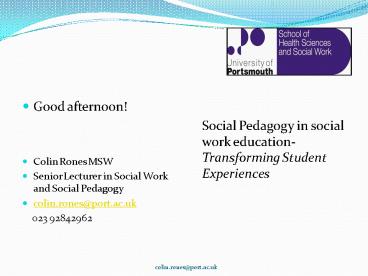Good afternoon - PowerPoint PPT Presentation
1 / 15
Title:
Good afternoon
Description:
... apprehensive about 10 days ago, more than anything because I was worried about ... The Concept of Social Pedagogy in the Field of Social Work. ... – PowerPoint PPT presentation
Number of Views:89
Avg rating:3.0/5.0
Title: Good afternoon
1
- Good afternoon!
- Colin Rones MSW
- Senior Lecturer in Social Work and Social
Pedagogy - colin.rones_at_port.ac.uk
- 023 92842962
- Social Pedagogy in social work
education-Transforming Student Experiences
2
- Creativity is 1 inspiration 99 perspiration!
3
Course info
- N 28 (7 groups)
- MSc in Social Work
- Unit Empowerment, Inclusion and Service users
- 6 weeks of lectures and project work
- Projects
- Community Work
- Faith
- Richards Journey (Disability theme)
- Grandparent Fostering (Ageism)
- Fostering ( Children in Care)
- Homelessness
- Care Leavers
4
Assessment
- 50 Group work
- Creative Artefact producing a teaching resource
(10) - Presentation (40mins)
- Meeting Records
- 50 Individual work
- Reflective Essay (summative)
- Personal Diary (750 words formative)
5
Social Pedagogy
- Social Pedagogy concentrates on questions of the
integration of the individual in society, both
in theory and in practice. It aims to alleviate
social exclusion. It deals with the processes of
human growth that tie people to the systems,
institutions and communities that are important
to well being and life management. The basic
idea of social pedagogy is to promote peoples
social functioning, inclusion, participation,
social identity and social competence as members
of society. P.76 Hamalainen (2003)
6
Key concepts
- Head - concepts, theory, reflective practitioner
- Heart - building relationships using ones
personality, positive attitude - Hands - through a shared life space and through
agency ( the common third) - (Petrie,(2006). Hatton, (2008).Thempra, (2008)
7
Heart
- Authentic relationships
- Respect acceptance of others
- Listening to the narratives of service users
service providers. Seeing the world from their
position. - Good group work skills - teamwork
8
Head
- Important to balance the head with the heart. To
preserve oneself. - Remain in touch with accountability
- Integration of theory ( Petrie. 2006)
- Reflection look at impact of work on self, make
sense of the information and the issues being
presented. - The presentation (40mins) sets out contextual
information but also includes examples of
theorists eg Thompsons PCS (ADP) and
participation and inclusion - Arnsteins ladder
of participation.
9
Hands
- Production of a teaching resource - a DVD
- Students are asked to consider the nature of
power in their relationship with service
users/providers in their presentations.
Creativity can provide opportunities to narrow
the power gap between service users/providers - ( Bagnoli,(2009) Muller, (2008).Packard,
(2008) ). Creating a
teaching resource provides the opportunity for
service users/providers to work together. - Pedagogues in their training are encouraged to
learn practical skills.
10
The Pedagogic triangle (Thempra, (2008).
11
What students told us
- I'd come across explanations of the models of
disability before, but never had theory brought
to life, nor have I spent almost every waking
minute reassessing certain things and situations
that I'd previously always taken for granted. I
love it! I think, on reflection, because I have
never known anyone with cerebral palsy, this kind
of task was the one I was most apprehensive about
10 days ago, more than anything because I was
worried about not being able to understand and
causing offence. It couldn't be more different
now. This is such a valuable experience
12
What service users told us
- I never thought I could be involved in working
with the university. I didnt think anyone would
take me seriously. - We liked the idea that students could come and
talk with our clients without staff involvement
or interference. The work (DVD) would be entirely
the work of clients.
13
Feedback from the external examiner
- This is a very challenging set of attachment
tasks. It should allow students to demonstrate
the identified learning outcomes clearly. - The reflective accounts were very interesting and
honest. The students clearly gained a great deal
of insight into both group process and service
user perspectives - The log is a useful way of identifying individual
participation in the group task
14
SWIG (social work inclusion group)
- Please investigate some of our work with the
social work inclusion group on the following
website - http//www.swig.uk.net/
- Thank you.
15
Bibliography
- Bagnoli, A (2009). Working Paper. (electronic
copy). Beyond the standard interview the use of
graphic elicitation and arts-based methods. The
University of Manchester - Doel, M and Shardlow,M (2005) Modern Social Work
Practice. Ashgate. - Hamalainen, J (2003). The Concept of Social
Pedagogy in the Field of Social Work. (Electronic
Version) Journal of Social Work. 3(1) 69-80. - Hatton, K (2008). New Directions in Social Work
Practice. Learning Matters - Muller, M ( 2008) . Visual competence a new
paradigm for studying visuals in social sciences?
( Electronic Version) Visual Studies. 23(2)
101-112. - Nieweg, M. Learning to reflect a practical theory
on teaching. European Journal of Social
Education. A semsteral periodical of FESET, 1. - Nohr, K. (2001). Learning to learn reflections
on students learning process in project work.
European Journal of Social Education. A semsteral
periodical of FESET, 1. - Packard, J. (2008) Im gonna show you what its
really like out there the power and limitation
of participatory visual methods. (Electronic
Version). Visual Studies. 23(1) 63-77. - Petrie, P. Boddy, J. Cameron, C. Wigfall, V.
Simon, A. (2006) Working with Children in Care .
European Perspectives. Open University Press .
McGraw-Hill Education. - Thempra (2008) Course handouts Social Pedagogy
training - creativity and well-being. March 2008
April 2008. - Thompson, N. (2001). Anti- Discriminatory
Practice 3rd Edtn. Palgrave.

























![⚡[PDF]✔ The Official Downton Abbey Afternoon Tea Cookbook: Teatime Drinks, Scones, PowerPoint PPT Presentation](https://s3.amazonaws.com/images.powershow.com/10079388.th0.jpg?_=20240716091)





